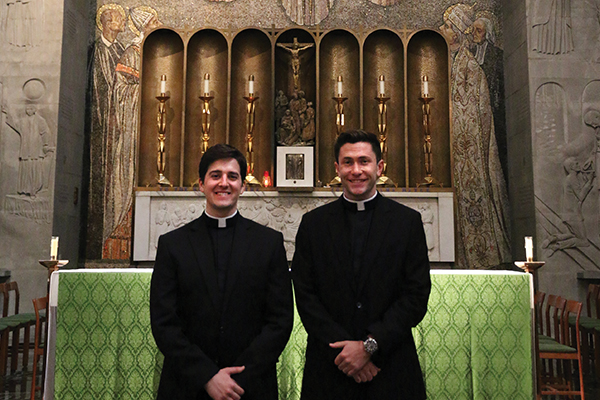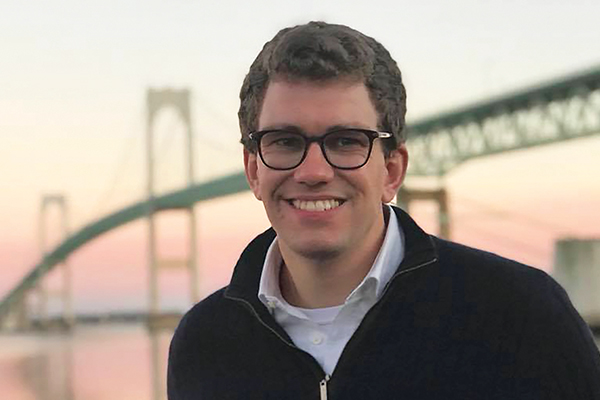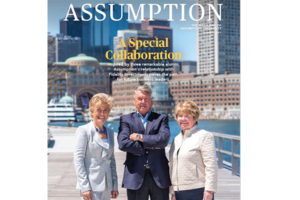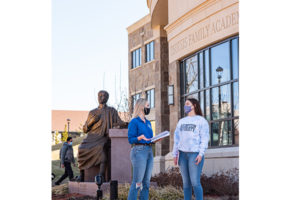By Holly Robinson

As a junior in high school, the future beckoned Michael Hoye ’16 with seemingly limitless possibilities. Then Hoye went on a run to train for his upcoming track season one afternoon “and my life was never the same.”
During that run, Hoye asked himself what – and who – he truly wanted to be. Among his favorite subjects in school, theology ranked high. That thought led him to a memory of third grade, when his best subject was religion; his teacher even joked about Hoye becoming a priest.
At age nine, this idea had seemed funny. On that fateful run, however, Hoye dared to ask a serious question: “What if I really am called to the priesthood?”
The idea made him nervous. “I never had a faster run home,” he admitted.
After some “intense pleading with God” to show him the way forward, Hoye opened the Bible and began reading. The first passage he came across (HEB. 5) was “all about the priesthood and how a man is called – not by himself, but by God,” he said. “It felt as if God were right in front of me and waiting for an answer. From the bottom of my heart, despite all of the unknowns, I said yes.”
Soon afterward, he attended Accepted Students Day at Assumption and heard President Francesco C. Cesareo, Ph.D., address students and their parents. “The way he was able to integrate Christ into the meaning of higher education was beyond inspiring,” Hoye said. Whether he ultimately chose the priesthood or not, one thing was now clear: he would be able to discover God’s real will for his life at Assumption.
Creating an environment of reflection and contemplation
According to Catholic World Report, the number of diocesan and religious seminarians worldwide climbed from 63,882 in 1978 to 112,643 by 2003 – a significant 76 percent increase. However, the U.S. lagged behind, with the number of American seminarians enrolled in college and theology programs suffering a steep decline of nearly 47 percent during that same time.
Working directly with people in a variety of contexts allows priests “to be the visible presence of Christ,” said President Cesareo, a Papal scholar and historian who has published research in a variety of areas, including the history of the Catholic Church and Catholic higher education. Now, given the shortage of priests in the U.S., “many priests find that the pastoral dimension of their work is diminished due to the many other administrative responsibilities they must now assume.”
As a Catholic institution, Assumption supports vocations that serve the Church, such as priesthood, consecrated religious life, the diaconate, and lay ministry. “This has led to a real resurgence of vocations to the priesthood,” said President Cesareo, “especially for a single institution.”
That support takes many forms, he explained. Most importantly, “Assumption lives out its Catholic identity in an explicit, unapologetic way. We recognize that the intellectual tradition of Catholicism has much to offer everyone.”
By promoting a campus environment of reflection and contemplation, students more easily integrate their spiritual lives with academic pursuits, he said. “We succeed in fostering not only a love of learning, but a desire in students to cultivate their relationships with God.”
Assumption has carefully instituted opportunities designed to foster religious vocations for both men and women, including vibrant Campus Ministry programs and an on-campus practice of Eucharistic adoration. There are also organized groups designed to support students as they discern their vocations or deepen their faith (SEE SIDEBAR).
One such group, the St. Marie Eugenie Women’s Discernment Group (SME), meets regularly with the mission of “exploring the ways we can deepen our understanding of God’s calling for us, whether it be through religious life, married life, single life, or a life of service,” said Julie Montminy ‘19, an SME leader who majors in elementary education and English.
The Assumption Sisters open their home for meetings, she explained, and “we invite guest speakers, such as various religious orders of Sisters, to talk about their mission and vocation stories.” Other speakers include professors and members of the Assumption community who share their personal and professional choices.
“We focus on getting to the seed and root of why someone chose her vocation,” said Montminy. “For example, when Sister groups come, we discuss how to recognize a ʻcalling’ or ʻtugging on your heart’ and how to answer it.”
Another organization, the Serra Club, “works to support and foster Catholic vocations to priesthood and vowed religious life,” said the club’s president, Christopher J. Rawson ‘13. “We help the brave individuals who have answered the call to make their transition to priesthood or religious life as easy as possible.”
The support of religious vocations on campus is in keeping with the institution’s commitment “to vocational discernment by all of its students,” said Deacon Paul Covino, director of Campus Ministry.
He noted that, in writing to young people in January 2017, Pope Francis cited the call of Abraham in Genesis to “set out towards a future which is unknown, but one that will surely lead to fulfillment.”

Living for something greater than ourselves
For students who ultimately pursue the long road to diocesan priesthood, Assumption works closely with the Diocese of Worcester to offer support. Seminarians who have not yet earned college degrees are assigned by the Bishop to the Holy Name of Jesus House of Studies with classes at Assumption. Graduates are then assigned to seminaries, where they earn Master of Divinity degrees prior to ordination.
Father James Mazzone, director of vocations for the Diocese of Worcester, works closely with Assumption students contemplating diocesan priesthood.
Often their own personal discernment journeys might have begun months, or even years, before. “I hear from them when they’re ready to bring everything they have been experiencing and feeling on the inside to the outside,” he said. “It is a sacred and special moment.”
For most, there is no thunderbolt of realization, but an ever-deepening conversation that begins with God and prayer, then gradually extends to friends, family, parish priests, and other mentors.
Hoye, for instance, continued that conversation both at Assumption and with the Diocese of Worcester. A three-season athlete, he was on the Campus Ministry Core Team, played instrumentals, sang with the institution’s choir and chorale groups, served on the Student Government Association, completed the Honors Program, and was in the first SOPHIA cohort.
“The more I learned about God, His Church, and the priesthood, the more I fell in love with the ministry that priests do,” he said.
After graduation, Hoye spent a year at Theological College, the national seminary in Washington, DC, to continue studies in philosophy. He is currently a seminarian in Rome, studying at the Pontifical North American College. “I learned Italian in the medieval city of Siena, where St. Catherine lived, where a Eucharistic Miracle occurred and where there are many incorruptible saints,” he said. “Perhaps my favorite aspect of living and studying in Rome is that the Eternal City herself will be among my greatest teachers.”
Hoye can’t help but think of the pilgrims, saints, and apostles – and Assumption students – who have walked the same streets he walks now. “Beneath the dirt and graffiti in Rome, there is a heart that beats and is very much alive. This is the heart of Christ’s body, the Church. I am humbled to bring that heartbeat back home as a priest, God willing.”
A desire for truth and authenticity
Through the Diocese of Worcester, LaRoche served at St. Paul‘s Cathedral and other area parishes. Now at the Pontifical North American College in Rome along with Hoye, he looks forward to coming back as a priest and “serving people, as I‘ve dreamed about doing for years now.”

While he and Hoye were both seriously considering the priesthood by high school, Brother Daniele Caglioni, A.A., ‘13 heard the call later. He chose Assumption for his undergraduate studies with the encouragement of his former parish priest, Rev. Joseph Joaquin, who had studied French at Assumption, and entered the institution “with a desire to be transformed, to live for something greater than myself.”
One of his most influential courses was Introduction to Philosophy with Professor Nicholas Opanasets, Ph.D., who “forced us to think on our feet about the fundamental questions of life,” he said. “Once I surrendered to the fact that the discipline of philosophy is as much about dwelling in the questions as it is providing concrete answers, I started to relish the invitation to questioning and discovery that I felt was being posed in my own life. From this came a deep desire for truth and authenticity.”
Br. Daniele was active in Campus Ministry and gradually embraced opportunities to co-lead retreats and prayer groups. He also interacted with the campus brothers and priests, whose “spirit of hospitality and generosity, a real spiritual fatherhood, attracted me right away.”
As an Assumptionist religious, Father Ronald Sibugan, A.A., is dedicated to communicating his love for his Assumptionist vocation and hopes that his Assumptionist spirit and charism are “manifested in my life of prayer, our mission, and my encounter with college students. As an Assumptionist religious, it is important for me to guide young people to nourish their vocations by building healthy relationships with them and creating space where they can reflect and talk about a life that matters. It is also important for me to share my vocation stories and how God has moved me to respond to the call to be in a religious life.”
In Br. Daniele‘s view, no vocation is “superior” to another. “God calls some people to marriage, some to religious life, some to diocesan priesthood, etc., but He does this for the good of everyone. What is most important is that we truly listen to His Spirit.”
Since graduation, he has traveled widely, starting with a young adult ministry in Florence, Italy. “My year of service in Italy was so grace-filled that I decided to apply for postulancy and officially enter formation with the Assumptionists,” he said. “I had spent a year in formation back at the institution, a year that was wrought with challenges as I felt caught between my former life as a student and my still nascent desire to pursue religious life. But God kept watch on my cammino – my journey – which I see as leading me closer to God.”
That journey took him next to the Philippines for a year of novitiate. There, he marveled at how “the faith of the Filipino people in God was so strong. Living among the poor made me realize my own spiritual poverty and how, fundamentally, I was a beloved sinner who needed God to guide his life. This cathartic experience of the centrality of God in my life helped me understand that this was a truth that I needed to share as a religious brother in the Assumptionists.” He made his first vows on June 24, 2016.
“As a religious, I am called to remind people of our common humanity,” Br. Daniele said, “and that each of us is created from love and for love. Thinking about our humanity leads us to even deeper questions about life, which in the silence of our hearts reminds us that, fundamentally, we are hardwired to desire God.”
SUPPORTING AND FOSTERING VOCATIONS
Assumption programs offer students many opportunities to reflect on God’s unique call for their lives, including the following:
SOPHIA (SOPHomore Initiative at Assumption) is a year-long program designed to encourage sophomores to develop a culture of vocational exploration.
Crossroads is a 24-hour retreat that engages students in prayer and reflection on
where God may be calling them.
The Assumptionist Community in Emmanuel House hosts a weekly discernment group for male students. Rather than directly focus on vocational discernment in a strictly religious-order sense, this group focuses on discerning whatever vocation God may be calling students toward in these formative years of their lives, whether in religious life or out of it.
The St. Marie Eugenie Women’s Discernment Group (SME), hosted by the Religious of the Assumption Sisters, provides opportunities for female students to understand the life of a religious community and explore various life vocations.
The Ministry Internship Program allows students considering religious vocations to work in a parish or other church setting with supervision by a seasoned minister at the site and mentoring by an Assumption campus minister.
The Serra Club is a Diocese of Worcester organization of lay men and women who come together in fellowship and prayer to support vocations through awareness, affirmation, and support.


